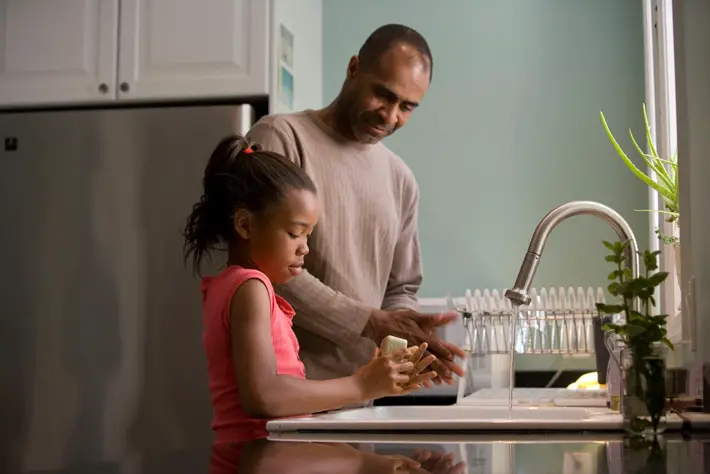4 Ways Parents Can Support their Child Through a Divorce

Divorce is tough on all involved, especially children, but it is possible to support them through the hardship. In this article, we explore the four ways parents can support their child through a divorce.
Divorce can be a stressful time for the divorcing couple, but where you have children together, it can also seriously impact their life too.
As a parent, you are responsible for being there for your children during this tough time. Divorce can impact many other areas of their life, such as school, relationships, and development, so it’s really important to address their feelings and help them to learn to cope.
If you are divorcing your spouse, a local solicitor in York, Leeds, or wherever else in the UK will be able to handle all the important and stressful aspects the legalities. This means you have time to focus on supporting your child through the divorce, as it can often be a challenging and difficult time for them. To find out more about the four ways you can support your child during a divorce, keep reading…
1. Respect Their Emotions
How a child reacts to their parent’s divorce often depends on their age. For some children, emotions may sway in one direction, whereas for children of different ages, they may react to the divorce entirely differently.
Age is not the only factor to consider when considering a child’s emotions. There’s also their personal circumstances at home and general life, such as their relationship with each parent, how the home life was prior to the divorce and whether they have any mental health issues.
In research that was conducted by child researchers, it was found that children can show distress from as early as 6 months old. This includes emotions such as fear, anger and anxiety. In addition to other problems in their life, such as school grades being impacted, struggling with sleeping, hostility and more.
It’s important to acknowledge these emotions and respect them, supporting them wherever possible.
2. Don’t Put Your Child in The Middle
The last thing you should do as a parent is put your child in the middle of a divorce. The best thing to do is not involve them. You can make them aware of the situation if you deem it necessary, and they are old enough to understand what is happening and why their parents are getting a divorce.
Arguing and fighting in front of them or asking for their opinion on the matter is automatically putting them in the middle. Doing this likely makes them mentally feel as if they might need to pick a side, or it could leave them feeling emotional and confused about what to do and how to handle the matter.
You should also avoid using children as a messenger. This can only make matters worse and leave them feeling tangled in the situation as well as negatively impacting them in the future, with important things like grades and relationships being harmfully affected.
There are some cases of teenagers participating in alcohol and substance abuse as a result of their parents’ divorce, often as a coping mechanism for how they feel. However, all these issues can be avoided with the correct support in place and not inflicting your relationship problems onto your children.
3. Allow Your Child to See Their Other Parent
As long as your child seeing the other parent does put them in danger, you should allow them to see their other parent, especially if it is something that they want.
If your child lives with you full time, this could impact your child’s and their other parent’s relationship. This can have a long-term effect in the future, such as behavioural issues, being unfocused, problems with mental health and more.
You may find allowing them to see and have contact with their other parent helps them to come to terms with your divorce. Spending time with both parents can also benefit them, allowing them to grow a stronger individual relationship that they may not have had when their parents were still together as a couple.
4. Provide Them with a Support Network
Sometimes as a parent, you may find that your children do not want to talk to you about how they are feeling. But, the best thing you can do is let them know that you are there with open arms if there is anything you can help them to talk about.
If your child doesn’t want to talk to you, it is best to respect their feeling. Try to understand that they may find it uncomfortable because they know you’re having conflict with their other parent, and they might feel like you can’t understand their feelings. If they do say no, it’s okay, you can still make them aware that they can come to you at any point.
If they choose not to discuss their feelings with you, it could be wise to find them a professional counsellor where they can openly talk to a third party who is neutral and outside of the situation.
Counselling has many positive benefits for children dealing with divorce, including coming to terms with the divorce and speaking openly about their feelings. It can help to prevent the adverse impact we have discussed like depression, bad school grades and other behavioural issues.
Putting Your Children First During Your Divorce is Important…
What we can conclude from this article is that divorce is hard, and there is the potential for your child to be severely impacted by your divorce, so it’s essential to focus on their wellbeing and make sure they have an efficient support network in place.
Parents often don’t realise the impact their divorce can have, and this can last with a child until they are an adult, so taking the time to prevent this is crucial. Supporting yourself, too, is important. You can’t put your children first if you are struggling yourself to cope, so make sure you find help too.
How have you supported your children through a divorce? Let us know in the comment box below.











